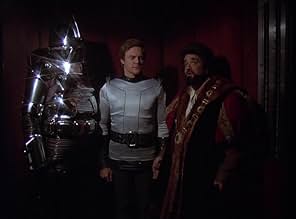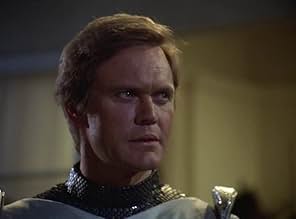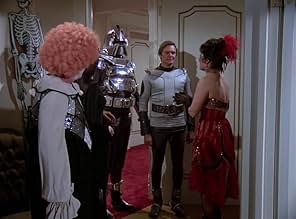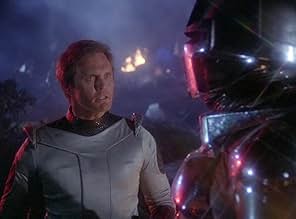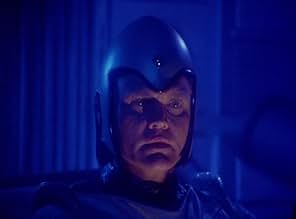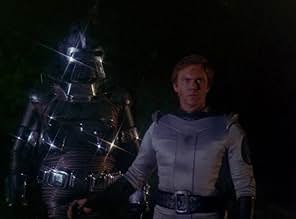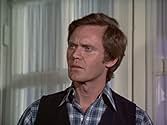Roger Davis(II)
- Actor
Roger Davis is an actor, producer and voice-over artist, who is most
remembered for taking over the role of Hannibal Heyes (a.k.a. Joshua
Smith) in the TV series,
Alias Smith and Jones (1971),
from his friend, Pete Duel, after Duel died of
a self-inflicted gunshot wound while intoxicated.
His assumption of the role was rather fitting, as he had appeared in an ABC Movie of the Week under the title, The Young Country (1970), his co-star being Duel, a Universal Studios contract player who was cast as the second lead. Davis had most recently appeared for two years (1968-70) as multiple characters on the vampire-themed daytime soap opera, Dark Shadows (1966). Before that, he had appeared as a solider in the World War Two-themed TV series, The Gallant Men (1962), which was broadcast in the 1962-63 season, and as a ranch hand in the short-lived 1963 TV Western series, Redigo (1963), which was canceled in the middle of its first season. In 1966, he shot a pilot for a TV series based on James Jones's classic WWII novel, From Here to Eternity (1953), cast in the pivotal role as "Pvt. Robert E. Lee Pruitt". The series was not picked up.
Neither was "The Young Country" pilot four years later. ABC did pick up the "Alias Smith and Jones" pilot as a mid-season replacement in January 1971. The Alias Smith and Jones pilot concept paid homage to the smash hit movie, "Butch Cassidy and the Sundance Kid (1969), and starred Duel as a character inspired by Paul Newman's Butch Cassidy. (In the movie, Butch and Sundance refer to themselves by the aliases Smith and Jones). Universal Studios contract player Ben Murphy was selected to play Duel's partner.
The producers called on Davis' skills as a voice-over artist to narrate the opening of each "Alias Smith and Jones" episode starring Duel & Murphy. He also appeared as an actor in the episode Smiler with a Gun (1971). Davis was the only person ever killed by Murphy's character, "Kid Curry", a reformed gunslinger inspired by Robert Redford's character, "The Sundance Kid".
Duel died on the morning of Friday, December 31, 1971, before shooting on the 1971-72 season could be completed. Eighteen episodes had been completed, and Duel had been working on Episode #19. Shooting with Murphy continued that Friday and Davis was immediately hired to replace his friend, thus completing the circle that began with both being considered for the same role in "Ride the Wild Surf" (1964) and "Love on a Rooftop"(1966) and continued with their starring together in "The Young Country". Davis appeared in the final five episodes of Season Two and all of the 12 episodes in Season Three, when the show was canceled in mid-season.
"Alias Smith and Jones" was scheduled in two of the most unenviable time slots in TV history. In its first two seasons, it appeared on Thursday night opposite "The Flip Wilson Show" (known as Flip (1970)), the #2 rated show in America. ABC switched it in the 1972-73 season to Saturday where its competition was another show that had debuted in January 1971, All in the Family (1971), the top-rated program on television and a genuine ratings phenomenon. From 1971 to 1976, "All in the Family" established a record with five consecutive seasons as the #1 rated show. "The Flip Wilson Show" slipped out of the Top 10 to #12 during the 1972-73 season that would prove to be the last for "Alias Smith and Jones".
Pete Duel publicly blamed the failure of ABC to pick up Love on a Rooftop (1966), the first of the two series in which he played a lead role, to network politics. ABC did not renew "Love on Rooftop" after its maiden 1966-67 season as another producer wanted the time slot, Duel claimed. Before his death, he also claimed that after its first season, ABC had considered moving "Alias Smith and Jones" for the 1971-72 season to Saturday night in the 8:30-9:30 slot vacated by the canceled The Lawrence Welk Show (1951), but left it on Thursday. Duel was disappointed that the network left his show where it was, as he felt the other slot would be better for his new series. He was very wrong, as it was the move to Saturday night, after Duel's death, that killed it.
"All in the Family" had debuted on Tuesday nights at 9:30 and was ranked #34 in its inaugural half-season. After being switched to Saturday at 8:00PM in the 1971-72 season (the season ABC had first considered switching "Alias Smith and Jones" to Saturday), it quickly ascended to the top of the ratings charts. It would prove a more formidable adversary than any "Hannibal Heyes" & "Kid Curry" ever met up with on their show, including "Danny Bilson", the gunman Roger Davis played in Smiler with a Gun (1971).
Roger Davis was unfairly blamed for some for the demise of "Alias Smith and Jones", on the grounds that he was unable to fill Pete Duel's boots. However, it's doubtful the show could have survived, even with Duel, as the network unwisely put the show up against the cultural phenomenon that was "All in the Family". The once popular TV Western was a dying genre, and in January 1973, the same month ABC ended the run of "Alias Smith and Jones", NBC pulled the plug on former ratings blockbuster Bonanza (1959) (three times the #1 show from 1964 to 1967 and #3 in both the 1968-69 and 1969-70 seasons), which joined "Alias Smith and Jones" in the Happy Hunting Grounds of canceled TV westerns. That left only Gunsmoke (1955) to cowboy up until it, too, left the airwaves in 1975.
Roger Davis continued to appear in guest roles in TV and the occasional low-budget film throughout the 1970s, but work became sparse in the '80s. As a voice artist, he has made over 6,000 commercials on TV and radio. He is a partner in the movie production company, "Lonetree Entertainment".
Apart from acting, Davis has enjoyed success as a real estate developer, not only building multi-million-dollar homes in the Hollywood Hills area but also renovating high-rise buildings, hotels and mansions. The Louisville, Kentucky native had been married four times: His first wife was actress Jaclyn Smith, of Charlie's Angels (1976) fame.
His assumption of the role was rather fitting, as he had appeared in an ABC Movie of the Week under the title, The Young Country (1970), his co-star being Duel, a Universal Studios contract player who was cast as the second lead. Davis had most recently appeared for two years (1968-70) as multiple characters on the vampire-themed daytime soap opera, Dark Shadows (1966). Before that, he had appeared as a solider in the World War Two-themed TV series, The Gallant Men (1962), which was broadcast in the 1962-63 season, and as a ranch hand in the short-lived 1963 TV Western series, Redigo (1963), which was canceled in the middle of its first season. In 1966, he shot a pilot for a TV series based on James Jones's classic WWII novel, From Here to Eternity (1953), cast in the pivotal role as "Pvt. Robert E. Lee Pruitt". The series was not picked up.
Neither was "The Young Country" pilot four years later. ABC did pick up the "Alias Smith and Jones" pilot as a mid-season replacement in January 1971. The Alias Smith and Jones pilot concept paid homage to the smash hit movie, "Butch Cassidy and the Sundance Kid (1969), and starred Duel as a character inspired by Paul Newman's Butch Cassidy. (In the movie, Butch and Sundance refer to themselves by the aliases Smith and Jones). Universal Studios contract player Ben Murphy was selected to play Duel's partner.
The producers called on Davis' skills as a voice-over artist to narrate the opening of each "Alias Smith and Jones" episode starring Duel & Murphy. He also appeared as an actor in the episode Smiler with a Gun (1971). Davis was the only person ever killed by Murphy's character, "Kid Curry", a reformed gunslinger inspired by Robert Redford's character, "The Sundance Kid".
Duel died on the morning of Friday, December 31, 1971, before shooting on the 1971-72 season could be completed. Eighteen episodes had been completed, and Duel had been working on Episode #19. Shooting with Murphy continued that Friday and Davis was immediately hired to replace his friend, thus completing the circle that began with both being considered for the same role in "Ride the Wild Surf" (1964) and "Love on a Rooftop"(1966) and continued with their starring together in "The Young Country". Davis appeared in the final five episodes of Season Two and all of the 12 episodes in Season Three, when the show was canceled in mid-season.
"Alias Smith and Jones" was scheduled in two of the most unenviable time slots in TV history. In its first two seasons, it appeared on Thursday night opposite "The Flip Wilson Show" (known as Flip (1970)), the #2 rated show in America. ABC switched it in the 1972-73 season to Saturday where its competition was another show that had debuted in January 1971, All in the Family (1971), the top-rated program on television and a genuine ratings phenomenon. From 1971 to 1976, "All in the Family" established a record with five consecutive seasons as the #1 rated show. "The Flip Wilson Show" slipped out of the Top 10 to #12 during the 1972-73 season that would prove to be the last for "Alias Smith and Jones".
Pete Duel publicly blamed the failure of ABC to pick up Love on a Rooftop (1966), the first of the two series in which he played a lead role, to network politics. ABC did not renew "Love on Rooftop" after its maiden 1966-67 season as another producer wanted the time slot, Duel claimed. Before his death, he also claimed that after its first season, ABC had considered moving "Alias Smith and Jones" for the 1971-72 season to Saturday night in the 8:30-9:30 slot vacated by the canceled The Lawrence Welk Show (1951), but left it on Thursday. Duel was disappointed that the network left his show where it was, as he felt the other slot would be better for his new series. He was very wrong, as it was the move to Saturday night, after Duel's death, that killed it.
"All in the Family" had debuted on Tuesday nights at 9:30 and was ranked #34 in its inaugural half-season. After being switched to Saturday at 8:00PM in the 1971-72 season (the season ABC had first considered switching "Alias Smith and Jones" to Saturday), it quickly ascended to the top of the ratings charts. It would prove a more formidable adversary than any "Hannibal Heyes" & "Kid Curry" ever met up with on their show, including "Danny Bilson", the gunman Roger Davis played in Smiler with a Gun (1971).
Roger Davis was unfairly blamed for some for the demise of "Alias Smith and Jones", on the grounds that he was unable to fill Pete Duel's boots. However, it's doubtful the show could have survived, even with Duel, as the network unwisely put the show up against the cultural phenomenon that was "All in the Family". The once popular TV Western was a dying genre, and in January 1973, the same month ABC ended the run of "Alias Smith and Jones", NBC pulled the plug on former ratings blockbuster Bonanza (1959) (three times the #1 show from 1964 to 1967 and #3 in both the 1968-69 and 1969-70 seasons), which joined "Alias Smith and Jones" in the Happy Hunting Grounds of canceled TV westerns. That left only Gunsmoke (1955) to cowboy up until it, too, left the airwaves in 1975.
Roger Davis continued to appear in guest roles in TV and the occasional low-budget film throughout the 1970s, but work became sparse in the '80s. As a voice artist, he has made over 6,000 commercials on TV and radio. He is a partner in the movie production company, "Lonetree Entertainment".
Apart from acting, Davis has enjoyed success as a real estate developer, not only building multi-million-dollar homes in the Hollywood Hills area but also renovating high-rise buildings, hotels and mansions. The Louisville, Kentucky native had been married four times: His first wife was actress Jaclyn Smith, of Charlie's Angels (1976) fame.


